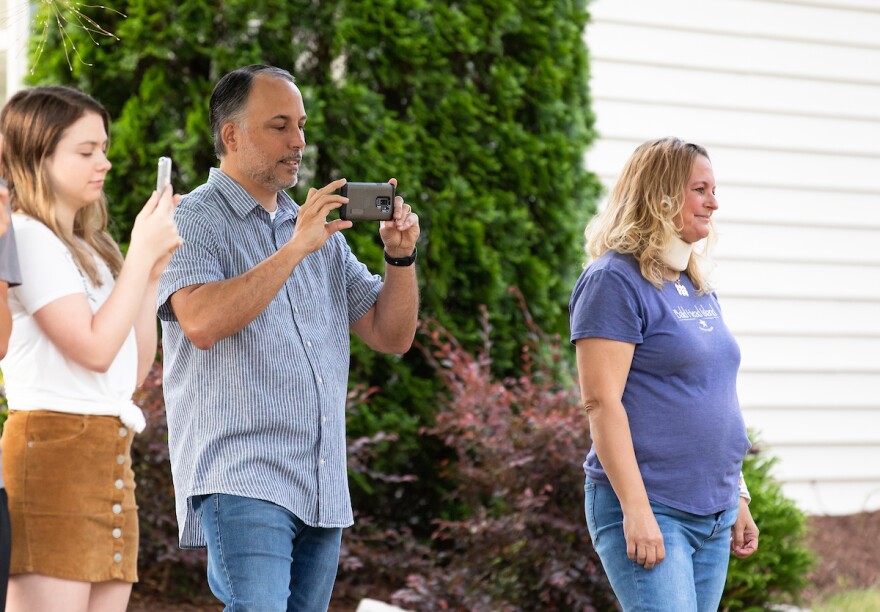These days, Friday and Saturday night Facebook Live streams are the biggest shows of the week for Travis Gales. In the pre-coronavirus world, the Durham DJ typically performed three times per week at bars, clubs, and restaurants.“It’s pretty much grounded to a halt, where I pretty much have nothing,” Gales said. “Only thing I have is my weekly radio show.”
That show on WNCU in Durham is just a volunteer gig.

So, over the past few weeks, Gales has been livestreaming — lowkey playlists during the weekdays and throwback party mixes on the weekend. He links his username for Cash App, a mobile payment service, in the video description in case folks want to donate. Those shows, as well as teaching DJ lessons remotely over Zoom, are how Gales is getting by during the pandemic.
“We'll have chat meetups, in which we'll discuss issues within the DJ industry, and how we all can try to come up with ways to make money during this time until something changes,” Gales said.
The coronavirus pandemic has resulted in sudden, dramatic losses in income for many local musicians. When everything is cancelled, the social gatherings that pay their bills are among the first to go. And there’s still no end date in sight.
Out of necessity, some are finding new ways to perform and make money.

In-person performances, from a distance
Raleigh resident Paula Snyder is a singer-songwriter. Among other performances, Snyder makes money delivering singing telegrams. She personalizes pop standards to surprise folks on their special occasions.
Though the gigs have stopped, Snyder said she continues to receive requests for in-person serenades. The telegrams look a bit different now under social distancing guidelines.
"In the days when we didn’t have to social distance, I might be ringing a doorbell and walking inside a home,” Snyder said. “But now, I’m not ringing any doorbells. I’m not knocking on any doors. I’m not touching anything around their area and they’re not close enough to me to breathe in my air.”
I'm not ringing any doorbells. I'm not knocking on any doors. I'm not touching anything around their area and they're not close enough to me to breathe in my air. -Paula Snyder
Snyder recently surprised three triplets celebrating their sixteenth birthdays at home in Raleigh. She also serenaded a Fuquay-Varina man in his driveway for his birthday, after his brother called in the request from Tennessee. Snyder, who charges on a case-by-case basis averaging about $150 per telegram, said she isn’t surprised to see the requests continue.
“(People) are bored,” she said. “They have nowhere to go and they can’t do anything, and then they have all these occasions.”
‘Musically enhanced voicemails’
Harpist Michelle Cobley, a Raleigh resident, is also coming up with new ways to help folks celebrate special occasions.
Though Cobley has been able to keep offering harp and piano lessons online, her gig income — which consisted of weddings, baby showers, and performing for patients at Duke University Hospital — has completely evaporated.
She said losing the hospital gig hurts the most.
“That’s more of an upsetting thing because I just absolutely love that job I have there,” Cobley said. “I just miss it so much.”
In the meantime, Cobley recently set up an online business called “Glissful Greetings.” The business is named after glissando, a musical technique in which instrumentalists slide between multiple pitches.
“I guess you could describe (the business) as musically enhanced voicemails, with someone’s personal greeting and then having harp music in the background to make it a little more special,” Cobley said.
For Mother’s Day, Cobley and her sister sent one of the virtual greetings to their mom. Cobley recorded her mother’s reaction in a video.
“She really liked it a lot,” Cobley said. “Because my sister lives in the Netherlands right now … we don’t get to be together, but I was able to edit it so our voices synced up and said ‘Happy Mother’s Day,’ which was really cool.”
Glissful Greetings go for $7 a piece. It might not make up for all of Cobley’s lost income, but she’s hoping it will help a little until people start holding big celebrations again.
‘The novelty of generosity’ wears off
For many musicians, though, livestreaming has been the closest thing resembling a replacement for in-person concerts.
Gabriel Reynolds is the lead singer and pianist of Wake Moody, a five-piece band out of Carrboro that fuses elements of R&B, pop and rock.
Reynolds, personally, derives “80-90 percent” of his regular income from in-person gigs. Over the past few months, he said the sudden loss of income and overall uncertainty surrounding his livelihood have weighed heavily on his mind.
“It’s just a million different clients, potential gigs, potential venues that all have different ideas of how this might shake out. I’m just waiting to see what happens to the world, and then we’ll all figure it out together,” Reynolds said. “But for now, everything just feels sort of open-ended and like a weird summer camp with no end to it.”
Throughout April, Reynolds performed for donations on Facebook Live about two to three times per week. Each livestream had a theme. One night, he played just Frank Ocean songs. Another time, he took requests from the comment section. He dedicated another performance to his four bandmates and split the donations five ways — just as they would at a regular Wake Moody gig.
But with each passing stream, the donations diminished. As Reynolds put it, “the novelty of generosity” had already worn off.
“It was a good release to be able to play for people online, but at the same time, it wasn’t a true replacement for playing in person,” said Reynolds, who hasn’t streamed since April 26. “Performing without making decent money was wearing me out.”
ADDITIONAL PHOTOS:









